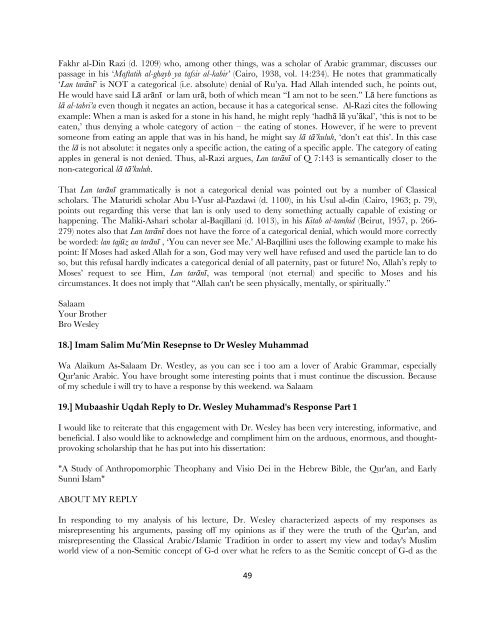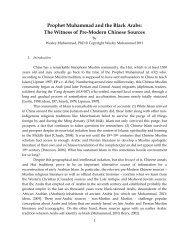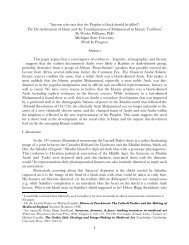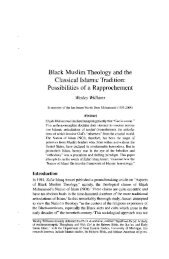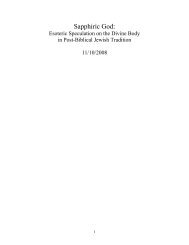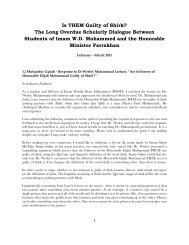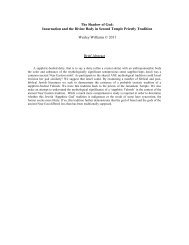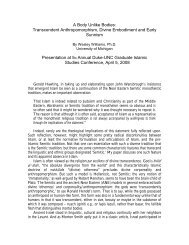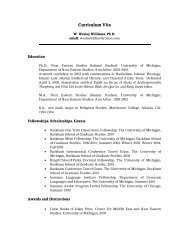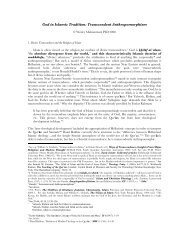Is THEM Guilty of Shirk? - Dr. Wesley Muhammad
Is THEM Guilty of Shirk? - Dr. Wesley Muhammad
Is THEM Guilty of Shirk? - Dr. Wesley Muhammad
Create successful ePaper yourself
Turn your PDF publications into a flip-book with our unique Google optimized e-Paper software.
Fakhr al-Din Razi (d. 1209) who, among other things, was a scholar <strong>of</strong> Arabic grammar, discusses our<br />
passage in his ‗Maftatih al-ghayb ya tafsir al-kabir‟ (Cairo, 1938, vol. 14:234). He notes that grammatically<br />
‗Lan tarānī‘ is NOT a categorical (i.e. absolute) denial <strong>of</strong> Ru‘ya. Had Allah intended such, he points out,<br />
He would have said Lā arānī or lam urā, both <strong>of</strong> which mean ―I am not to be seen.‖ Lā here functions as<br />
lā al-tabri‟a even though it negates an action, because it has a categorical sense. Al-Razi cites the following<br />
example: When a man is asked for a stone in his hand, he might reply ‗hadhā lā yu‘ākal‘, ‗this is not to be<br />
eaten,‘ thus denying a whole category <strong>of</strong> action – the eating <strong>of</strong> stones. However, if he were to prevent<br />
someone from eating an apple that was in his hand, he might say lā tā‟kuluh, ‗don‘t eat this‘. In this case<br />
the lā is not absolute: it negates only a specific action, the eating <strong>of</strong> a specific apple. The category <strong>of</strong> eating<br />
apples in general is not denied. Thus, al-Razi argues, Lan tarānī <strong>of</strong> Q 7:143 is semantically closer to the<br />
non-categorical lā tā‟kuluh.<br />
That Lan tarānī grammatically is not a categorical denial was pointed out by a number <strong>of</strong> Classical<br />
scholars. The Maturidi scholar Abu l-Yusr al-Pazdawi (d. 1100), in his Usul al-din (Cairo, 1963; p. 79),<br />
points out regarding this verse that lan is only used to deny something actually capable <strong>of</strong> existing or<br />
happening. The Maliki-Ashari scholar al-Baqillani (d. 1013), in his Kitab al-tamhid (Beirut, 1957, p. 266-<br />
279) notes also that Lan tarānī does not have the force <strong>of</strong> a categorical denial, which would more correctly<br />
be worded: lan tajūz an tarānī , ‗You can never see Me.‘ Al-Baqillini uses the following example to make his<br />
point: If Moses had asked Allah for a son, God may very well have refused and used the particle lan to do<br />
so, but this refusal hardly indicates a categorical denial <strong>of</strong> all paternity, past or future! No, Allah‘s reply to<br />
Moses‘ request to see Him, Lan tarānī, was temporal (not eternal) and specific to Moses and his<br />
circumstances. It does not imply that ―Allah can't be seen physically, mentally, or spiritually.‖<br />
Salaam<br />
Your Brother<br />
Bro <strong>Wesley</strong><br />
18.] Imam Salim Mu‟Min Resepnse to <strong>Dr</strong> <strong>Wesley</strong> <strong>Muhammad</strong><br />
Wa Alaikum As-Salaam <strong>Dr</strong>. Westley, as you can see i too am a lover <strong>of</strong> Arabic Grammar, especially<br />
Qur'anic Arabic. You have brought some interesting points that i must continue the discussion. Because<br />
<strong>of</strong> my schedule i will try to have a response by this weekend. wa Salaam<br />
19.] Mubaashir Uqdah Reply to <strong>Dr</strong>. <strong>Wesley</strong> <strong>Muhammad</strong>'s Response Part 1<br />
I would like to reiterate that this engagement with <strong>Dr</strong>. <strong>Wesley</strong> has been very interesting, informative, and<br />
beneficial. I also would like to acknowledge and compliment him on the arduous, enormous, and thoughtprovoking<br />
scholarship that he has put into his dissertation:<br />
"A Study <strong>of</strong> Anthropomorphic Theophany and Visio Dei in the Hebrew Bible, the Qur'an, and Early<br />
Sunni <strong>Is</strong>lam"<br />
ABOUT MY REPLY<br />
In responding to my analysis <strong>of</strong> his lecture, <strong>Dr</strong>. <strong>Wesley</strong> characterized aspects <strong>of</strong> my responses as<br />
misrepresenting his arguments, passing <strong>of</strong>f my opinions as if they were the truth <strong>of</strong> the Qur'an, and<br />
misrepresenting the Classical Arabic/<strong>Is</strong>lamic Tradition in order to assert my view and today's Muslim<br />
world view <strong>of</strong> a non-Semitic concept <strong>of</strong> G-d over what he refers to as the Semitic concept <strong>of</strong> G-d as the<br />
49


